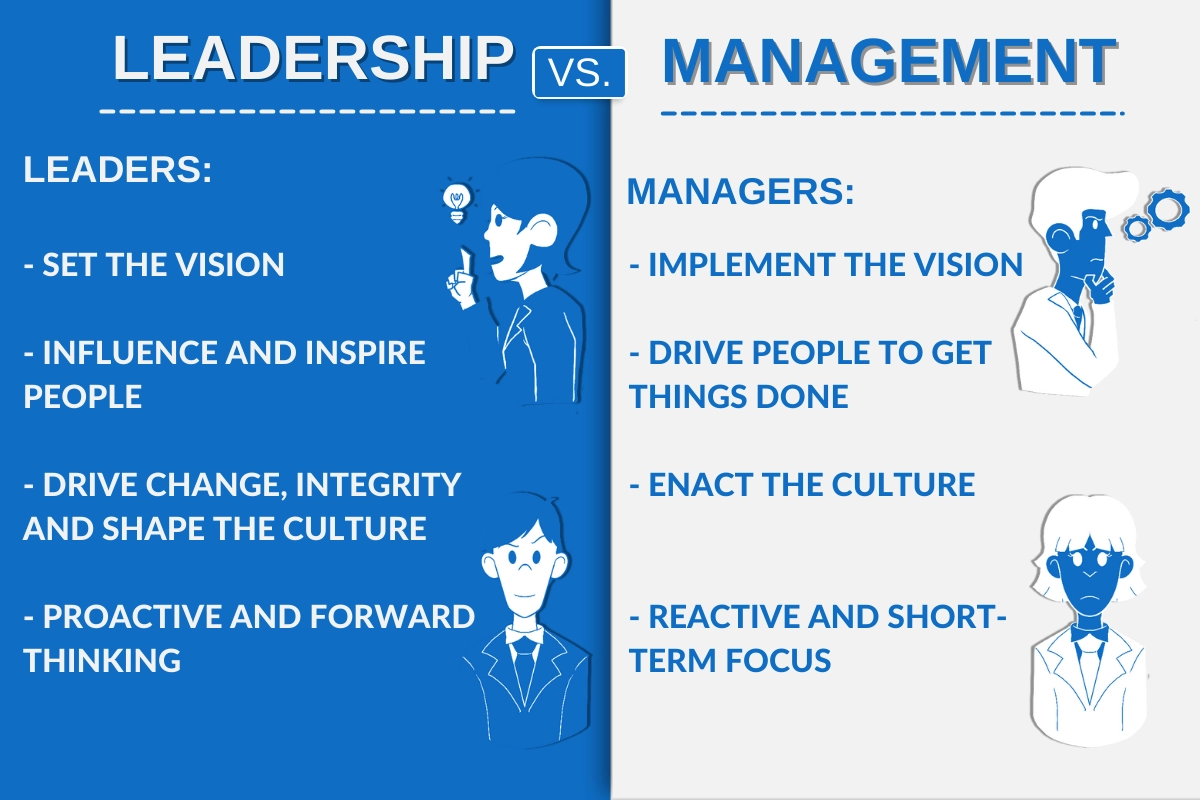What are the differences between a manager and a leader? People in every organisation look up to their leaders for direction. As a leader, you set the vision for your organisation. You must be able to bring that vision to life so that others can see it too. You’re passionate about your vision and that comes through when you are communicating it to others. You focus on the bigger picture. You are very much aware of how everything works together or must work together for you to realise that vision.
People in organisations rely on their managers to tell them what to do. A manager looks after a function and sometimes a team or many teams. As a manager, your key goal is to ensure that people, processes and systems are in place and working. You are responsible for making sure that tasks are completed. You focus on targets and deadlines. Your duty is to get the work done. You do so by driving the people in your team to get things done. It is your responsibility to understand the key performance indicators (KPIs) for your team and to ensure that you are meeting them. You will have to ensure that teams are well resourced. A manager often reports to a leader. You take instructions from a leader and put them in place. You report progress to a leadership team.
Leaders and Managers need people
Both leaders and managers need people. A leader inspires and influences people around them. A great leader has an interest in developing the next generation of leaders. As a leader, you inspire others by leading by example. You let your actions speak for you and you show them what it takes to be a great leader. You’re the one to create the environment and space for people to develop and to grow. You take joy and pride in seeing people developing and growing.
A good manager knows their team well. Due to the close working relationship between you and your team members, you are able to understand how you can motivate them. You will know how to bring the best out of them. Yet, sometimes, you may be so focused on achieving your targets that you forget to tap into your team’s strengths. You may ignore signs that you are overworking your team members and may miss signs that morale is low. You may also miss that your team is very unhappy.
For most managers, developing team members is not their number one priority. In managing your team, you set performance goals and objectives for them. These may be individual or team-oriented. You agree on it with your respective team members at an appraisal or performance meeting. But you have more urgent things to attend to. Your staff’s development can wait. After all, they have the skills and the knowledge you need them to have for their roles. The fundamental issue to this approach is that by the time you require a different skill set to meet a new goal, it is too late to up-skill your team.
Proactive vs Reactive
Managers are often reactive. Your actions are in response to what is happening in your organisation and around you. You are rarely one step ahead of the game. You are always playing catch-up. By being reactive and focusing on the short term, you fail to plan for the future. However, being reactive to challenges mean that you are able to respond to and deal with the challenges as they arise. You keep the workplace operating smoothly.
Leaders are proactive and forward-thinking. As a leader, you see beyond the short and medium term. Your ‘what if’ scenarios go beyond your current objectives. Your thinking is much deeper, what does the future hold? How can you influence that? How can you prepare yourself, your people and your organisation for the future? What will your customers want from you? How can you fulfil your future customer needs?
Leaders and Managers
Leaders are transformational. As a leader, you drive positive change in organisations. You shape the culture of organisations. You leave your mark. People remember you for a long time, long after you are gone and in a good way. People aspire to become like you. To them, you are what a great leader should be like. You embody leadership in its very essence and is full of integrity. You’re not interested in the blame game, you say sorry when you are wrong and help people who need your help. You’re humble enough to ask for help. You know that you do not know it all and you’re willing to learn from others. You set the right tone and make it easy for people to follow.
A manager enacts the culture. You show people how “we do things around here”. You are keen to ensure that people fit into the culture. They do what is expected of them. You need to know that people often stay in or leave organisations because of their managers. You directly impact on ‘I love my job’ or ‘I hate my job’. These often translate into ‘I have a great manager; I love my manager’ or ‘my manager is horrible! I hate my manager’. It is your responsibility to ensure that your culture creates a happy and supportive environment.
You are as great as the people you lead or manage. Be the leader you hope to see and the manager you hope to have.

